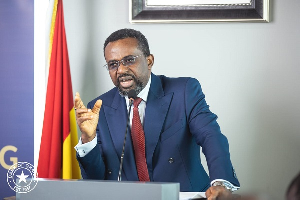In my first article on the above subject, I made it clear that the Ghana Police Service needs the support of the populace as a whole if it is to succeed in its professional task of both detecting and deterring crime in the country.
I made the point that the work of the police would be made easier if the Service, as a whole, made greater efforts to gain the respect of the populace. I also noted that the police would not gain the respect of the public and the support it engenders if the Service continues to ignore concerns expressed by the public about how it goes about its business; especially, if it remains stony-faced and tight-lipped about comments made by opinion leaders in the country.
Now, to buttress the fact that the Service routinely treats with silence, enquiries made about specific cases that have attracted public notice, I gave as an example, the numerous articles I have personally written about the murder, eight years ago, of Madam Ama Hemaa, a 72-year-old woman who entered the wrong house and slept on the wrong bed in the wrong room at Tema, believing that she had arrived at the home of her son, whom she had travelled many miles by lorry, to visit.
Why has this old woman’s fate become an “issue” with me? It’s because it aroused the humanitarian instincts in me. First, she was obviously old and helpless; second, she was sick, and exhibited symptoms that suggested dementia. Such people are extremely vulnerable and so the police had a duty to use the opportunity to educate the public on their plight.
Second, her murder was clearly an instance of public lynching, a phenomenon which the police are very familiar and which threatens law and order at a very basic level. Then, there was the superstitious element in the case, with a so-called “evangelist” apparently acting as ring-leader, who diagnosed the old lady as a witch. Apart from the fact that these are serious examples of the police failing in their duty to protect the weak members of our society, by punishing those who maltreat them, so as to deter other citizens from taking the law into their hands (on the basis of wrongful suspicion) it is totally unacceptable, in a democracy, that the police and the AG’s Department should feel free to open prosecutions and close them at will, that is, without due process. That is certainly not the best way to make the “rule of law” a reality to the citizenry.
What I have said above must be received with a good heart by the police, if the public is to be encouraged to offer the police the co-operation necessary for it to succeed in its task. For how can the public know, for instance, that the police would use any information given by the public to it, to serve the public good, if the police constantly refuse to answer legitimate questions the public are asking about police behaviour?
Is it not well-known that some members of the Service are so corrupt that they are capable of using information supplied by the public to extort money from suspects? If confidence is the key to unlocking information from the public, where do the police think they stand with the public, in relationship to that? Does the Service not know that no-one is going to lift a finger to help the police, if unconcern about public confidence has created, in the mean time, a very cynical attitude from the general public towards the police? This cynical attitude is perhaps the worst aspect of the relationship between the police and the public.
Nevertheless, on the assumption that the police are not above changing their ways, in order to achieve success in the herculean task that currently confronts them, I suggest to the Ministry of the Interior to make proposals to the government – if it has not already done so – to thoroughly modernise the Service.
In the UK, for instance, it is almost impossible to find a policeman appearing in public whose turnout does not incorporate accoutrements for two-way communications. In the USA, some police forces are now routinely equipped with helmets that carry mini-cameras on them. The Americans largely use these cameras to deter police officers from molesting the public. But their use for capturing footage of crime scenes, even if incidental, enables reinforcing elements to pre-plan how, and where, to mount an effective counter-offensive where necessary.
Police patrols, especially at night, should also be increased, especially at known crime locations. Foolhardy criminals exist who would think nothing of confronting the police, of course. But a show of strength – patrols of several armed men, especially, mobile surveillance of neighbourhoods – can yield good dividends. The police should take action to eliminate the contempt with which the public views check-points, by testing checkpoint personnel regularly to weed out those who think their primary duty is to collect bribes from the innocent public.
The police should also seek to keep the public constantly informed. Apart from briefing the media, they should issue bulletins on cases of national interest. They should know what to keep in and what to leave out of such communications, in order not to alert suspects. Constant dialogue between the police and the public would yield good results, in that they would let the public know the types of information that is useful to the police, as against the type of “gossip” or speculation” that just wastes precious police time.
Finally, the police should make it pleasant for members of the pubic to visit police stations. A friendly atmosphere will dispel the notion that one only goes to a police station in time of trouble, or that policemen are generally “bullies”. In this case, I am sure familiarity will breed reciprocal warmth, not the proverbial contempt.
Opinions of Sunday, 18 March 2018
Columnist: cameron Duodu















